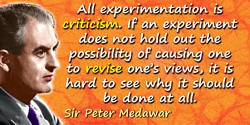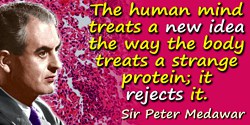 (source)
(source)
|
Sir Peter B. Medawar
(28 Feb 1915 - 2 Oct 1987)
English immunologist and author who was awarded a Nobel Prize for making skin grafts possible without tissue rejection.
|
Sir Peter B. Medawar Quotes on Process (5 quotes)
>> Click for 53 Science Quotes by Sir Peter B. Medawar
>> Click for Sir Peter B. Medawar Quotes on | Discovery | Evidence | Hypothesis | Imagination | Mind | Scientist | Theory | Truth |
>> Click for 53 Science Quotes by Sir Peter B. Medawar
>> Click for Sir Peter B. Medawar Quotes on | Discovery | Evidence | Hypothesis | Imagination | Mind | Scientist | Theory | Truth |
Deductivism in mathematical literature and inductivism in scientific papers are simply the postures we choose to be seen in when the curtain goes up and the public sees us. The theatrical illusion is shattered if we ask what goes on behind the scenes. In real life discovery and justification are almost always different processes.
— Sir Peter B. Medawar
Induction and Intuition in Scientific Thought (1969), 26.
Every discovery, every enlargement of the understanding, begins as an imaginative preconception of what the truth might be. The imaginative preconception—a “hypothesis”—arises by a process as easy or as difficult to understand as any other creative act of mind; it is a brainwave, an inspired guess, a product of a blaze of insight. It comes anyway from within and cannot be achieved by the exercise of any known calculus of discovery.
— Sir Peter B. Medawar
In Advice to a Young Scientist (1979), 84.
Scientific discovery, or the formulation of scientific theory, starts in with the unvarnished and unembroidered evidence of the senses. It starts with simple observation—simple, unbiased, unprejudiced, naive, or innocent observation—and out of this sensory evidence, embodied in the form of simple propositions or declarations of fact, generalizations will grow up and take shape, almost as if some process of crystallization or condensation were taking place. Out of a disorderly array of facts, an orderly theory, an orderly general statement, will somehow emerge.
— Sir Peter B. Medawar
In 'Is the Scientific Paper Fraudulent?', The Saturday Review (1 Aug 1964), 42.
The scientific method is a potentiation of common sense, exercised with a specially firm determination not to persist in error if any exertion of hand or mind can deliver us from it. Like other exploratory processes, it can be resolved into a dialogue between fact and fancy, the actual and the possible; between what could be true and what is in fact the case. The purpose of scientific enquiry is not to compile an inventory of factual information, nor to build up a totalitarian world picture of Natural Laws in which every event that is not compulsory is forbidden. We should think of it rather as a logically articulated structure of justifiable beliefs about nature. It begins as a story about a Possible World—a story which we invent and criticise and modify as we go along, so that it ends by being, as nearly as we can make it, a story about real life.
— Sir Peter B. Medawar
Induction and Intuition in Scientific Thought (1969), 59.
There is nothing distinctively scientific about the hypothetico-deductive process. It is not even distinctively intellectual. It is merely a scientific context for a much more general stratagem that underlies almost all regulative processes or processes of continuous control, namely feedback, the control of performance by the consequences of the act performed. In the hypothetico-deductive scheme the inferences we draw from a hypothesis are, in a sense, its logical output. If they are true, the hypothesis need not be altered, but correction is obligatory if they are false. The continuous feedback from inference to hypothesis is implicit in Whewell’s account of scientific method; he would not have dissented from the view that scientific behaviour can be classified as appropriately under cybernetics as under logic.
— Sir Peter B. Medawar
Induction and Intuition in Scientific Thought (1969), 54-5.
See also:
- 28 Feb - short biography, births, deaths and events on date of Medawar's birth.
- Advice to a Young Scientist, by Sir Peter Brian Medawar. - book suggestion.
- Booklist for Peter Medawar.


 In science it often happens that scientists say, 'You know that's a really good argument; my position is mistaken,' and then they would actually change their minds and you never hear that old view from them again. They really do it. It doesn't happen as often as it should, because scientists are human and change is sometimes painful. But it happens every day. I cannot recall the last time something like that happened in politics or religion.
(1987) --
In science it often happens that scientists say, 'You know that's a really good argument; my position is mistaken,' and then they would actually change their minds and you never hear that old view from them again. They really do it. It doesn't happen as often as it should, because scientists are human and change is sometimes painful. But it happens every day. I cannot recall the last time something like that happened in politics or religion.
(1987) -- 


